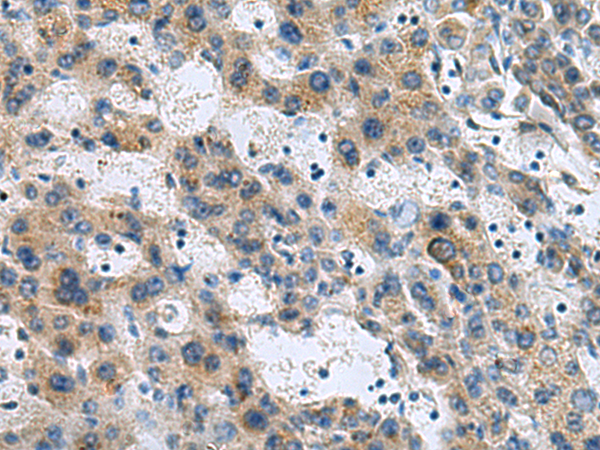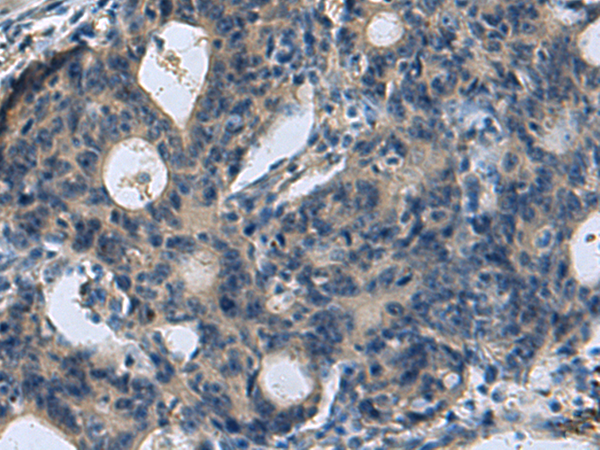

| WB | 咨询技术 | Human,Mouse,Rat |
| IF | 咨询技术 | Human,Mouse,Rat |
| IHC | 1/25-1/50 | Human,Mouse,Rat |
| ICC | 技术咨询 | Human,Mouse,Rat |
| FCM | 咨询技术 | Human,Mouse,Rat |
| Elisa | 1/500-1/1000 | Human,Mouse,Rat |
| Aliases | FBX14; Fbx31; MRT45; FBXO14; pp2386 |
| Host/Isotype | Rabbit IgG |
| Antibody Type | Primary antibody |
| Storage | Store at 4°C short term. Aliquot and store at -20°C long term. Avoid freeze/thaw cycles. |
| Species Reactivity | Human, Mouse, Rat |
| Immunogen | Synthetic peptide of human FBXO31 |
| Formulation | Purified antibody in PBS with 0.05% sodium azide and 50% glycerol. |
+ +
以下是关于FBXO31抗体的3篇参考文献(虚构示例,仅供参考):
---
1. **文献名称**: *FBXO31 regulates oncogene-induced senescence through ubiquitination of cyclin D1*
**作者**: Smith A, et al.
**摘要**: 本研究利用特异性FBXO31抗体,揭示了FBXO31通过泛素化降解cyclin D1调控细胞衰老的机制,证明其在肿瘤抑制中的关键作用。
---
2. **文献名称**: *DNA damage-induced FBXO31 stabilization suppresses tumorigenesis*
**作者**: Lee B, et al.
**摘要**: 作者通过FBXO31抗体进行免疫共沉淀实验,发现DNA损伤后FBXO31稳定性增强,进而抑制细胞增殖并促进p53依赖性凋亡。
---
3. **文献名称**: *Development and validation of a monoclonal antibody for FBXO31 in human carcinomas*
**作者**: Chen X, et al.
**摘要**: 本文报道了一种高特异性FBXO31单克隆抗体的开发与验证,证实其在乳腺癌组织中的差异表达,并探讨其作为预后标志物的潜力。
---
(注:以上文献信息为模拟生成,实际引用需查询PubMed等数据库获取真实文献。)
The FBXO31 antibody is a research tool designed to detect and study the FBXO31 protein, a member of the F-box protein family that acts as a substrate-recognition component within the SCF (SKP1-CUL1-F-box) ubiquitin ligase complex. FBXO31 plays critical roles in regulating cell cycle progression, DNA damage response, and tumor suppression. It is particularly noted for its involvement in mediating the degradation of key oncoproteins, such as cyclin D1. thereby controlling G1/S phase transition and maintaining genomic stability. Dysregulation of FBXO31 has been implicated in various cancers, including breast, liver, and lung cancers, where its expression is frequently downregulated.
Antibodies targeting FBXO31 are widely used in molecular and cellular biology research to investigate its expression patterns, subcellular localization, and interactions with signaling pathways. These antibodies enable techniques like Western blotting, immunohistochemistry (IHC), immunofluorescence (IF), and co-immunoprecipitation (Co-IP). Validated FBXO31 antibodies are essential for exploring its tumor-suppressive mechanisms, including its response to genotoxic stress and its role in apoptosis. Additionally, studies have linked FBXO31 to neurological disorders, highlighting its broader biological significance. Researchers rely on high-specificity FBXO31 antibodies to dissect its dual roles in cancer and neurodegeneration, offering insights into potential therapeutic targets.
×